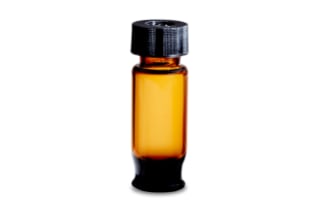
TruView pH Control LCMS Certified Vials are produced following tightly controlled manufacturing processes and handling procedures. They are tested for cleanliness by mass spectrometers and for low analyte adsorption by LC-MS/MS.
|
Certified |
TruView pH Control LCMS Certified |
|
Closure Type |
Screw Neck |
|
Cap Color |
Black |
|
Dimensions |
12 x 32 mm |
|
Format |
Max Recovery Vial |
|
Material |
Amber Glass |
|
Seal Material |
PTFE/Silicone |
|
Volume Capacity |
1.5 mL |
|
Type |
Autosampler vial |
|
Includes |
Vial, Cap, & Septum |
|
Sample Limited |
Sample Limited |
|
UNSPSC |
41121806 |
|
Application |
Sample Preparation |
|
Brand |
TruView |
|
Product Type |
Vials |
|
Units per Package |
100 pk |

TruView pH Control LCMS Certified Amber Glass, 12 x 32 mm, Screw Neck Vial, Max Recovery, with Cap and PTFE/Silicone Septum, 1.5 mL Volume, 100/pk
Use the TruView pH Control LCMS Certified Amber Glass, 12 x 32 mm, Screw Neck Vial's tight construction and snug fit to safely deposit your delicate analytes, samples, and solutions. To prevent the deterioration of delicate laboratory materials, the lab equipment is painted an amber color. The vial also provides compositional stability within a certain range, sufficient to withstand chemical and mechanical forces. You can be sure that there won't be any interference with the analysis results, thanks to its chemical inertness. The only vials available for LC and LC/MS Analysis are those offered by Waters.
The TruView pH Control LCMS Certified Amber Glass, 12 x 32 mm, Screw Neck Vial by Waters is produced to the highest ISO 9001 standards and utilizes the finest materials. The lab equipment is also approved to be within the neck opening, neck center, threads, and bottom thickness dimensional limitations for autosamplers. Adherence to these parameters is essential since out-of-dimension vials might result in needle damage and subsequent system downtime, damaging lab equipment as well as incurring a sizable system outage that may delay research. Therefore, after being packaged for several days, each batch of vials is tested to assess its cleanliness and quality in order to guarantee that your lab receives only the highest-quality equipment.
The universal screw cap that comes with the TruView pH Control LCMS Certified Amber Glass, 12 x 32 mm, Screw Neck Vial forms a good seal while mechanically holding the septum in place during piercing. Excellent resealing capabilities are displayed by its preslit PTFE/Silicone septa.
Utilize our catalog to find items made to meet various analytical demands that are compatible with the TruView pH Control LCMS Certified Amber Glass, 12 x 32 mm, Screw Neck Vial, and more. The catalog also allows you to shop for lab equipment directly from us.
We recommend that you also purchase the Black Cap and Preslit PTFE/Silicone Septum for TruView Vials. The PTFE/Silicone septum is advised for repeated injections and sample storage because it has shown to be effective at resealing. The PTFE/Silicone septum, which has a recommended operating temperature range of -40°C to 200°C, is excellent for a variety of applications since it is chemically resistant up until it is punctured, at which point it becomes chemically compatible with silicone. Due to the tight dimensional tolerances of all Waters vials and accessories, they can be used with almost all HPLC systems.
How Does Separation Change With Temperature?
Retention diminishes and quicker elution is achievable at higher temperatures. Retention frequently rises at lower temperatures, particularly in reversed-phase separations.